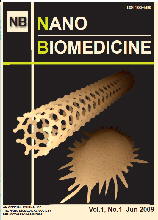
Nano Biomedicine
ORIGINAL ARTICLE
Systemic Administration of Insulin in Subcutis of Rats for in Vitro Calcified Nodule Deposition by Bone Marrow Cells
Masataka YOSHIKAWA, Ayano MIYAMOTO,
Hitomi NAKAMA, and Hiroshi MAEDA
Department of Endodontics, Faculty of Dentistry, Osaka Dental University, Osaka, Japan
Nano Biomed 2020; 12(2):69-76, (Dec 30, Nano Biomedicine)
Synopsis
The purpose of this study was to assess the activation of stem cells in bone marrow after administering insulin to rats. The prompt proliferation of stem cells and differentiation into osteoblasts or odontoblasts are necessary and desirable processes for bone or tooth regeneration. There may be factors that promote these processes effectively and insulin was hypothesized as one such factor. Calcified nodule formation by bone marrow cells was quantified. Six 5-week-old male Fischer 344/N Slc rats were used. The insulin solution for injection was prepared at a concentration of 1 U/mL in PBS (-) from the formulation dry with potency at 27.5 units/mg or more. The solution (0.5 U) was injected into the dorsal subcutaneous tissue of rats in 2-day intervals for 11 days. The other rats that were not administered insulin subcutaneously were used as a control group. After an 11-day injection period, bone marrow cells were removed from the femur. The cells collected from rats injected with insulin subcutaneously were cultured in medium containing β-glycerophosphate with or without dexamethasone and ascorbic acid. Conspicuously formed calcified nodules were decalcified in 10 % formic acid. Two-way unrepeated ANOVA followed by post hoc analysis with Tukey-Kramer's test was performed. Differences of p < 0.01 were considered significant. A significant amount of Ca2+ was found in culture of bone marrow cells from the rats injected with insulin. With rBMCs from insulin-injected rats, 196.34 ± 15.49 mg/mL of Ca2+ was produced when Dex was added to the medium. Without insulin injection, the cells cultured with Dex produced 126.34 ± 1.87 mg/mL. It is concluded that bone marrow cells obtained from rats with systemic insulin administration exhibited a high ability to form calcified nodules.
Key words: in vitro, dexamethasone, insulin, stem cells, calcified nodule
All documents in this paper (Free)
J-Stage https://www.jstage.jst.go.jp/article/nano/12/2/12_69/_article
DOI https://doi.org/10.11344/nano.12.69
The purpose of this study was to assess the activation of stem cells in bone marrow after administering insulin to rats. The prompt proliferation of stem cells and differentiation into osteoblasts or odontoblasts are necessary and desirable processes for bone or tooth regeneration. There may be factors that promote these processes effectively and insulin was hypothesized as one such factor. Calcified nodule formation by bone marrow cells was quantified. Six 5-week-old male Fischer 344/N Slc rats were used. The insulin solution for injection was prepared at a concentration of 1 U/mL in PBS (-) from the formulation dry with potency at 27.5 units/mg or more. The solution (0.5 U) was injected into the dorsal subcutaneous tissue of rats in 2-day intervals for 11 days. The other rats that were not administered insulin subcutaneously were used as a control group. After an 11-day injection period, bone marrow cells were removed from the femur. The cells collected from rats injected with insulin subcutaneously were cultured in medium containing β-glycerophosphate with or without dexamethasone and ascorbic acid. Conspicuously formed calcified nodules were decalcified in 10 % formic acid. Two-way unrepeated ANOVA followed by post hoc analysis with Tukey-Kramer's test was performed. Differences of p < 0.01 were considered significant. A significant amount of Ca2+ was found in culture of bone marrow cells from the rats injected with insulin. With rBMCs from insulin-injected rats, 196.34 ± 15.49 mg/mL of Ca2+ was produced when Dex was added to the medium. Without insulin injection, the cells cultured with Dex produced 126.34 ± 1.87 mg/mL. It is concluded that bone marrow cells obtained from rats with systemic insulin administration exhibited a high ability to form calcified nodules.
Key words: in vitro, dexamethasone, insulin, stem cells, calcified nodule
All documents in this paper (Free)
J-Stage https://www.jstage.jst.go.jp/article/nano/12/2/12_69/_article
DOI https://doi.org/10.11344/nano.12.69